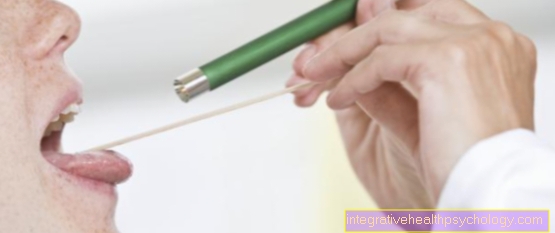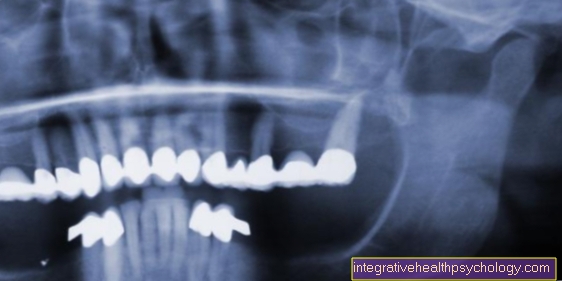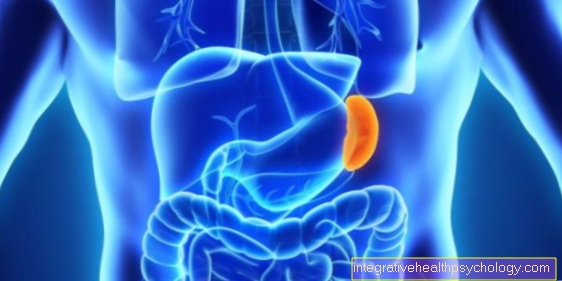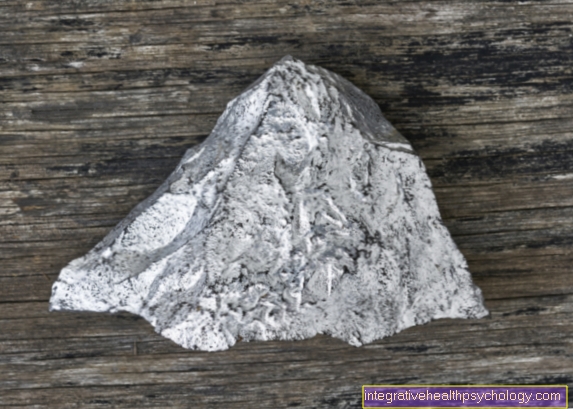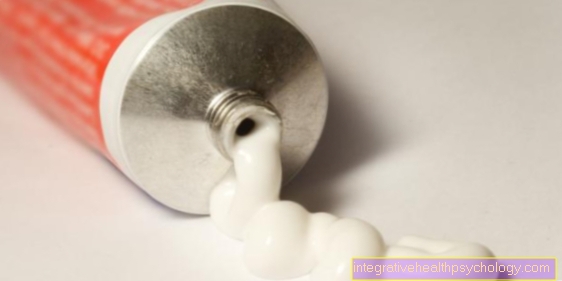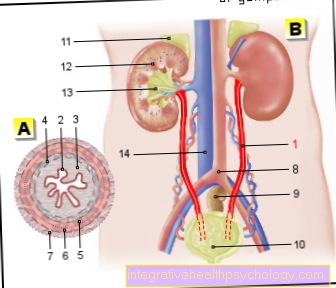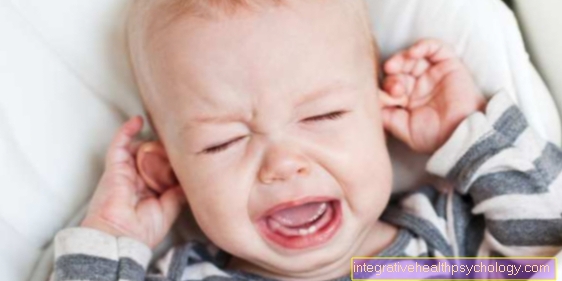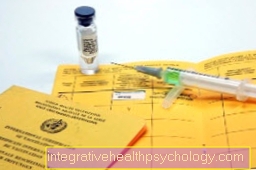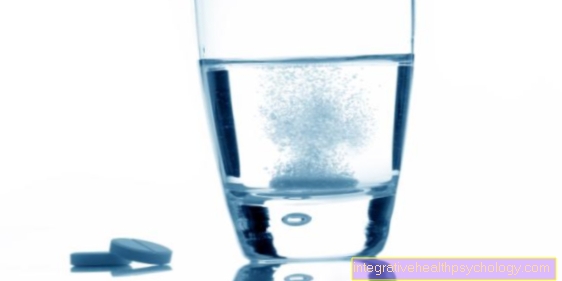Urge to urinate
definition
Urge to urinate describes the feeling of having to urinate. This in itself is a normal function of the bladder, which starts with their increasing filling. However, if the urge to urinate is unusually strong, this is an indication that there may be a disorder in the body or in the control loop of the urination reflex.

Physiological origin of the urge to urinate
You usually divorce roughly per day depending on the amount you drink one and a half liters of urine out. This is used by the Kidneys that produces the blood filter and urine waste from the body (urinary substances) transport.
The urine is stored in the bladderwhich, depending on the height of the person, can hold up to 900 ml of urine. However, the urge to urinate starts much earlier, namely from a bladder filling of approximately 300 ml. This urge to urinate is caused by the increasing stretching of the wall of the urinary bladder caused by their filling, in that the increase in tension is detected by receptors, which in turn with annoy are connected. These nerves transmit information about the filling status of the bladder to the brain further, in which the urge to urinate is then triggered and consciously perceived.
Physiologically, there is a certain leeway provided by the difference between the filling volume of the bladder when the urge to urinate begins and the maximum bladder capacity, so that one does not have to urinate immediately when the urge to urinate sets in. In addition, the urge to urinate in healthy people can be influenced to such an extent that it is possible to hold the urine despite a full bladder and an existing urge to urinate (Continence). Responsible for this is Pelvic floor muscles and also the external bladder sphincter (External urethral sphincter muscle), which can be controlled arbitrarily and consciously.
The Bladder emptying (micturition) therefore takes place in the interplay of pressure increase in the bladder with relaxation of the pelvic floor muscles and the external bladder sphincter. This micturition reflex is controlled centrally in the brain and, due to the complex interconnection, there are many possibilities for a disruption within the interaction.
Cause of increased urination
There are many different causes of the urge to urinate.
A fundamental distinction is made between the urge to urinate, which occurs only occasionally, and that which persists over a longer period of time. For the occasional urge to urinate can increased drinking to be responsible.
The same effect can through alcohol or Coffee consumption caused. There is also an increased urge to urinate during use diuretic drugs (Diuretics) on. However, the urge to urinate is the desired effect of these drugs, which are intended to ensure that a lower volume of blood remains in the body, which they achieve by excreting correspondingly higher amounts of urine. Diuretics are used, for example, for Kidney disease or in the therapy of the High blood pressure.
Another not negligible trigger for increased urination is psychological stress. A typical example is the feeling of having to go to the bathroom before an exam.
However, if the urge to urinate persists for a long time, this can be a sign of an underlying illness. An important example of this is the Diabetes mellitus. The so-called also occurs very rarely Diabetes insipidus before, with which up to 15 liters of urine can be excreted daily.
The urge to urinate also occurs with impaired kidney performance, for example due to a Renal failure. Here are the Kidneys From a certain stage onwards, you are no longer able to concentrate your urine, which is why large amounts of urine are excreted and, as a result, often an urge to urinate.
Diseases such as Heart failure lead to an urge to urinate. Another typical cause of urination is the common one Cystitis, in which a bacterial infection of the urinary tract causes inflammation and consequent irritation of the urinary tract bladder which then results in an urge to urinate.
One is also very common in older men benign enlargement of the prostate (Prostatic hyperplasia), which then the urethra can narrow so much that it is difficult to urinate, so that residual urine remains in the bladder, which then quickly refills and leads to an urge to urinate.
The urge to urinate can also be considered Follow an operation in the area of the bladder or after it Irradiation occur.
More symptoms to help isolate the cause
Common to all causes of the urge to urinate is the need to urinate. However, depending on the cause, the symptoms vary in severity and are also accompanied by various other signs.
This is what happens with the first type of Diabetes mellitus to a pronounced Feeling thirsty and consequently through large amounts of drinking to pass a lot of urine. Another often occurs at the same time Weight loss on.
At the Type two of diabetes It can also lead to the urge to urinate, but here it occurs as a long-term consequence for years poorly controlled blood sugar levels to Nerve damagewhich can also affect the nerves of the bladder. These then lose the function of informing the brain about the filling status of the bladder at an early stage and only report this after a major stimulus, i.e. when the bladder is already very full. Then it is often too late and those affected do not make it to the toilet in time and lose small amounts of urine (overflow bladder, overflow incontinence).
Is there a Renal failure In addition to the urge to urinate and initially large amounts of urine, it also comes with it Fluid build-up (Edema) in the legs and often in addition to one Itching of the skin.
At a Heart failure (Heart failure) there is also edema on the legs during the day and there is often one decreased physical performance in front. To urination and frequent urination it comes here more at night.
At a Prostate enlargement The typical symptom after the urge to urinate is that the onset of urination is unintentionally delayed, the urine stream is usually only weakened and often also urge to urinate at night consists.
If the urge to urinate occurs through a Cystitis caused on, can only small amounts of urine are excreted and there is pain, especially one Burn. All in all, those affected feel defeated and sometimes kicks in as well fever on.
Nocturnal need to urinate
When at night more than two times the bladder needs to empty, this is called Nocturia designated. Various factors can lead to an urge to urinate at night. So one cause is that Taking diuretic drugs too latewhich then develop their effect at night and lead to the urge to urinate at night. The simplest solution is to start taking these drugs earlier.
Another common cause of nocturnal urination is that Cystitis. It also happens with an enlarged prostate too nocturnal urge to urinate. This is also characteristic of cardiac insufficiency (insufficiency). During the day it comes through a insufficient pumping capacity of the heart to a Fluid build-up (Edema) in the legs, which then appear swollen and heavy. At night, this edema is absorbed and the body has a larger amount of fluid available, which it then wants to compensate through the urine excretion, which becomes symptomatic when the urge to urinate at night.
A very interesting and important aspect is that the urge to urinate, which is psychogenic, i.e. triggered without an underlying organic cause, usually does not occur during sleep but only during the day. Consequently, an urge to urinate that wakes the affected person from sleep should be regarded as an indication of a causative organic disease.
Urge to urinate, but nothing comes
Frequent need to urinate, but with little or nothing, is defined as Pollakiuria designated. The most common cause of this in men is benign enlargement of the prostate. Through this enlargement the urethra becomes narrowedso that a high resistance arises in it, which can only be overcome by high pressure, i.e. when the bladder is filled with a large amount. As a result, however, the bladder cannot empty completely, since the pressure in the urethra can no longer be overcome with less bladder filling. Therefore, there is usually still a feeling of incomplete emptying, even though there is little or no urine.
It is also typical that nothing comes despite the urge to urinate Irritable bladder, in which the overactive bladder generates an urge to urinate even when it is minimally filled, with only the smallest amounts of urine being excreted. The same phenomenon can be caused by a pregnancy to be triggered. Also leads one Cystitis This means that usually only small amounts of urine can be excreted, as the inflamed bladder, like the irritable bladder, triggers the urge to urinate too early.
Urination in man
A typical reason for that Urination in man is the benign enlargement of the prostate (Hyperplasia) or more rarely their inflammation (Prostatitis). The prostate increases in size with increasing age and over time almost every man is affected by it. It is not uncommon for this cause to become symptomatic as early as the age of 50 in the form of an urge to urinate.
Along with the urge to urinate, urination is delayed and the urine stream is weakened, which causes the bladder to appear cannot be completely emptied. The residual urine left behind is a risk factor for developing a cystitis. The treatment aims to stop the prostate from growing. This can medicinal or operational can be achieved.
Urination in woman

In the woman One of the most common causes of urination is one Cystitisbecause the urethra in women compared to men shorter is. Hence can bacteria get into the bladder faster and become one there inflammation to lead.
The urge to urinate is also typical in women pregnancy. On the one hand, this one can be one of the first sign of pregnancy On the other hand, it occurs as the pregnancy progresses due to the baby's growth in size and the consequent compression of surrounding organs, such as the bladder.
The so-called also occurs relatively often in women Irritable bladder, an overactive bladder. This then reports information to the even with low filling quantities braincausing the urge to urinate even though the bladder is only slightly full.
Urinary urgency during pregnancy
Urinary urgency during pregnancy is characteristic especially in its early phase and can be from around the sixth week of pregnancy occur, whereby the urge to urinate can be the first sign of pregnancy. The urge to urinate in early pregnancy is mainly caused by the hormonal change in the woman's body.
But even as the pregnancy progresses, there is often a need to urinate, which then primarily affects the baby's growth and thus a Increase in size of the uterus which then presses on surrounding structures and organs, such as the urinary bladder.
Urinary urgency with / without pain
A typical cause of urination that is associated with Painful urination goes hand in hand is the Cystitis (Cystitis), in which the pain has a burning character.
In most cases, the urge to urinate and the subsequent urination painless and often to causes like one Enlargement of the prostate or simply one increased amount of drinking traced back. But since he also has other internal diseases like a Weak heart or kidneys urge to urinate should be checked by a doctor, even if it does not cause pain.
Diagnosis of increased urination
Since an excessive urge to urinate can also be caused by a serious illness, it is important to present yourself to your doctor with these symptoms. This then represents in the anamnese Questions about the symptoms such as whether the urge to urinate also occurs at night or whether there is an increased feeling of thirst and can then usually narrow down the cause of the disease based on the anamnesis.
Possibly the collection of a so-called Micturition diary necessary, in which the person concerned documents when the urge to urinate occurs and how large the amount of drink is, which in turn allows conclusions to be drawn about the trigger of the urge to urinate.
In the subsequent physical exam the doctor pays attention to findings that could explain an urge to urinate, for example, he checks a man to see whether it is enlarged prostate present. In addition, a Sonography (Ultrasonic) of the Kidneys to see if there are any changes that could explain the urge to urinate.
Usually one also takes place Examination of urine and blood, in which on the Salt concentrations (Electrolytes), the respective Sugar value and also on the Creatinine Concentration, which is a parameter for the performance of the kidney, is respected.
Imaging examinations can be made specifically for these urological symptoms, in which the bladder and the urinary tract can be imaged after administration of contrast agent and even assessed directly while urinating (Micturition cyst urography).
Find out more about the topic here: Frequent urination
therapy
Treatment of the urge to urinate depends on the underlying cause.
For example, if there is a chronic disease such as a heart or a Renal failure before, the diseases must be treated well and controlled so that in the best case the symptom of the urge to urinate disappears again. The same principle applies to the treatment of the diabeteswhich must be optimally adjusted in order to avoid secondary diseases and to reduce any existing symptoms.
If a benign enlargement of the prostate is the cause of the urge to urinate in men, this may medicinal treated so that urination is easier. If the drug measures are insufficient, the patient can also benefit from one surgical removal of the prostate benefit.
Is the urge to urinate Cystitis this is usually the case antibiotic treated. In addition, it should be used daily with this type of infection to be drunk a lot and the patient should take care of yourself physically.
If no underlying physical disease can be blamed for the urge to urinate, it becomes a so-called Bladder training The aim is to get the overactive bladder used to larger volumes again. Plus there is too Medication how Anticholinergics and Antispasmodics, which are used specifically to relieve the symptom of urination, which can significantly increase the quality of life of the person affected.
Medicines for urination
The urge to urinate can be controlled medically by means of various means Medication to treat. Typical are drugs from the group of Anticholinergics or also the AntispasmodicsThe aim of this is to relax the bladder so that it can hold larger amounts of filling and only later triggers the urge to urinate. Men with an enlarged prostate can take drugs from the group of Alpha blockers benefit that the Musculature relax the prostate and bladder, making urination easier again.
forecast
Depending on the underlying cause of the urge to urinate, the prognosis varies. For example, one heals Cystitis during antibiotic therapy mostly after a week without consequences. Also one very good prognosis has the urge to urinate, which is one of the first symptoms of Type I diabetes can be perceived. Through an adequate Treatment with insulin This leads to a normalization of the feeling of thirst and, consequently, of the urge to urinate.
In contrast, the urge to urinate is when Type II diabetes a consequence of nerve damage to the bladder and a symptom in the late stage of the diabetes. There is one here significantly worse prognosis, as the damaged nerves often fail to regenerate even with optimized therapy for the underlying disease.
If there is an enlarged prostate that triggers the increased urge to urinate, there is generally one good prognosis. Although the enlarged prostate cannot normally be reduced under conservative therapy, its steady growth can be inhibited and the symptom of the urge to urinate can also be alleviated with medication. If this is not enough, the prognosis of the urge to urinate can usually be greatly improved by surgical removal of the prostate.
If the urge to urinate is based on chronic diseases such as cardiac or renal insufficiency, then let yourself this often through adequate drug therapy against the underlying disease or symptomatically against the urge to urinate itself improve.
prophylaxis
The best Prophylaxis in the event of an urge to urinate due to underlying diseases like diabetes, cardiac or Kidney disease is the optimal treatment and cessation of these diseases so that the urge to urinate cannot arise at all. The urge to urinate is caused by dehydrating Medication (Diuretics), care should be taken that this not in the evening be taken, which can at least reduce the need to urinate at night. If the urge to urinate is not based on a recognizable external cause, one should Keep the consumption of coffee or alcohol as low as possibleboth of which cause a certain urge to urinate.


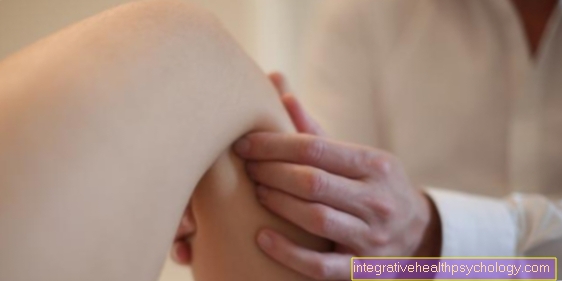




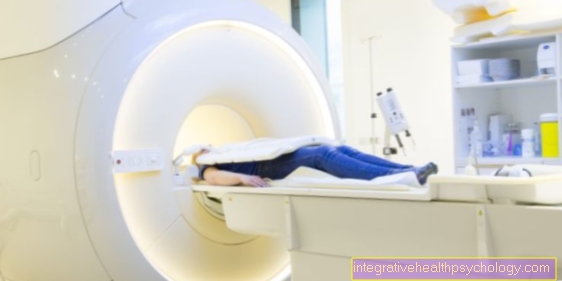
.jpg)
